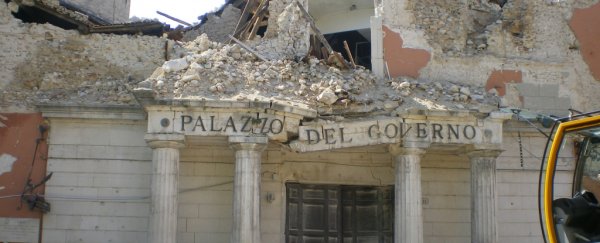Most researchers will remember clearly the moment when the L'Aquila earthquake scientists were convicted of manslaughter back in 2012. The seven researchers – three seismologists, a volcanologist, and two seismic engineers – were each given six-year jail sentences for their bad advice in the lead-up to the deadly 2009 earthquake, setting a new precedent for scientific culpability.
But now Italy's supreme court has cleared six of the researchers for good, after a lengthy deliberation involving a panel of five judges. The seventh scientist, Bernado De Bernardinis, has had his conviction upheld, but his jail sentence has been reduced to two years. He was deputy head of Italy's civil protection department at the time of the earthquake.
The L'Aquila earthquake struck in central Italy on 6 April 2009 with a magnitude of 6.3, killing 309 people and injuring more than 1,500. Hundreds of smaller quakes had hit the region in the months leading up to the earthquake, and the seven scientists were brought in as part of an advisory committee to analyse the danger of a major quake.
They told the public that the chance of danger hadn't increased or decreased and they would be safe in their homes, but the judge in the original trial, Marco Billi, called their work a "superficial, approximate and generic" risk analysis. Billi explained that the scientists were not guilty of failing to predict the earthquake, but failing to "discharge their duties under the law," as Edwin Cartlidge reports for Science magazine.
The six scientists were first acquitted last year during an appeal, but the recent hearing took place after appeals prosecutor Romolo Como asked that the convictions be reinstated.
After a 10-hour closed door hearing, the five-judge panel delivered their verdict, and acquitted the six scientists for good, as well as maintaining De Bernardinis' shortened sentence. "Justice has finally been done," said one of the scientist's lawyers, Alessandro Stefano.
The main defence for the scientists was that their work was solid, and there was no reason for them to think that the risk of a major earthquake had increased following the foreshocks, even though other seismologists have suggested that can be the case.
But the problem is that despite the scientist's neutral assessment, De Bernardinis reassured the public that they were safe, and that "the ongoing tremors were favourable because they discharged energy and therefore made a larger quake less likely," as Science reports. This wasn't the case.
The scientific community are understandably relieved about the ruling – UK seismologist Ian Main from the University of Edinburgh told Nature last year: "We don't want to have to be worried about the possibility of being prosecuted if we give advice on earthquakes. That would discourage giving honest opinion."
But the families of the victims aren't as thrilled. "If they had said there was a risk they would have done their job," said Maurizio Cora, whose wife and two daughters were killed by the earthquake. "But they didn't have the balls to say that."
